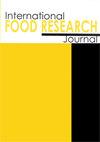Is there a reactive IgG antibody for severe acute respiratory syndrome coronavirus 2 (SARS-CoV-2) in maternal breast milk?
IF 0.7
4区 农林科学
Q4 FOOD SCIENCE & TECHNOLOGY
引用次数: 0
Abstract
Restricted data on the transmission of severe acute respiratory syndrome coronavirus 2 (SARS-CoV-2) reactive IgG antibodies by breast milk to infants, born to mothers who did not know if they had coronavirus disease 2019 (COVID-19), are presented. The objective of the present work was to demonstrate the existence of specific IgG antibodies against the SARS‐CoV‐2 virus in the milk of breastfeeding mothers in the suburban area of Şanlıurfa, Türkiye. This retrospective analysis examined the medical records of maternal and neonatal data for all 51 newborns to 50 mothers from September to October 2020. The present work was approved by the local medical ethics committee. Written informed consent was obtained from the mothers. Testing SARS-CoV-2 reactive IgG was performed using ELISA assay. SARS-CoV-2 reactive IgG were detected in 58% of breast milk. Over the past year, SARS-CoV-2 reactive IgG identified in breast milk of mothers without symptoms of viral respiratory infection (self-reported diagnosis) was 12.5 times lower than mothers with symptoms. The IgG responses were different between symptomatic and asymptomatic mothers’ and infants’ samples. These results propose that along with the COVID-19 pandemic, breastfeeding could be safe, and the existence of SARS-CoV-2-reactive IgG antibodies in breast milk could provide passive immunity to breastfed infants, and keep them safe against COVID-19 infection.母乳中是否存在针对严重急性呼吸综合征冠状病毒2 (SARS-CoV-2)的反应性IgG抗体?
本文介绍了不知道自己是否患有2019年冠状病毒病(COVID-19)的母亲所生的婴儿通过母乳传播严重急性呼吸综合征冠状病毒2 (SARS-CoV-2)反应性IgG抗体的限制性数据。本研究的目的是证明在Şanlıurfa、基基耶郊区母乳喂养的母亲的乳汁中存在针对SARS - CoV - 2病毒的特异性IgG抗体。这项回顾性分析检查了2020年9月至10月期间所有51名新生儿和50名母亲的孕产妇和新生儿数据的医疗记录。本研究得到了当地医学伦理委员会的批准。获得了母亲的书面知情同意。ELISA法检测SARS-CoV-2反应性IgG。在58%的母乳中检测到SARS-CoV-2反应性IgG。在过去一年中,在没有病毒性呼吸道感染症状(自我报告诊断)的母亲的母乳中发现的SARS-CoV-2反应性IgG比有症状的母亲低12.5倍。有症状和无症状母亲和婴儿的IgG反应存在差异。这些结果表明,随着COVID-19大流行,母乳喂养可能是安全的,母乳中存在的sars - cov -2反应性IgG抗体可以为母乳喂养的婴儿提供被动免疫,并使他们免受COVID-19感染。
本文章由计算机程序翻译,如有差异,请以英文原文为准。
求助全文
约1分钟内获得全文
求助全文
来源期刊

international food research journal
Agricultural and Biological Sciences-Food Science
CiteScore
1.40
自引率
0.00%
发文量
75
期刊介绍:
The International Food Research Journal (IFRJ) publishes papers in English, six (6) issues a year with the coverage of:
Food Science and Technology
Nutrition and Dietetics
Agriculture, multidisciplinary
Chemistry, multidisciplinary
The scope of the Journal includes:
Food Science, Food Technology and Food Biotechnology
Product Development and Sensory Evaluation
Food Habits, Nutrition, and Health
Food Safety and Quality
Food Chemistry, Food Microbiology, Food Analysis and Testing
Food Engineering
Food Packaging
Food Waste Management
Food Entrepreneur
Food Regulatory
Post-Harvest Food Management
Food Supply Chain Management
Halal Food and Management
 求助内容:
求助内容: 应助结果提醒方式:
应助结果提醒方式:


